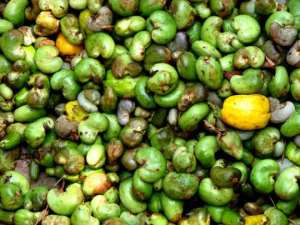
Ghana is blessed with rich agricultural potential, and must increase the recognition for the multifaceted benefits of cashew and mango plantations. Beyond being valuable cash crops, these plantations have the potential to play a crucial role in facilitating river flows, enhancing climate resilience, and improving community livelihoods. In this article, we explore the interconnected relationship between cashew and mango plantations and their positive impact on environmental sustainability and socio-economic development in Ghana.
Cashew and mango plantations have unique characteristics that contribute to the facilitation of river flows. The deep root systems of cashew trees help stabilize soil, preventing erosion and reducing sedimentation in rivers. This, in turn, promotes healthier river ecosystems and helps maintain consistent water flow. The dense canopy of mango trees also aids in reducing surface runoff and enhancing groundwater recharge, contributing to sustained river flows even during periods of low rainfall.
In the Mim District of Ghana, a community-led initiative has established cashew and mango plantations to combat soil erosion and improve river health. By integrating agroforestry practices, the Mim community has not only increased their income through cashew and mango production but has also positively impacted the local river system. Reduced sedimentation and improved water retention have been observed, benefiting both the environment and the local communities.
The Ahafo Ano South district in Ghana has embraced cashew cultivation as a means of sustainable development. The project has not only enhanced the economic conditions of local farmers but has also contributed to improved river flows. By adopting environmentally friendly farming practices, the project has become a model for sustainable cashew cultivation with positive implications for local rivers.
Cashew and mango plantations act as natural buffers against climate change impacts. The ability of these trees to thrive in diverse climatic conditions makes them well-suited for climate-resilient agriculture. The shade provided by the trees helps mitigate temperature extremes, reducing the vulnerability of crops and enhancing overall agricultural productivity. Additionally, the presence of these plantations contributes to carbon sequestration, aiding in the fight against climate change.
The positive correlation between cashew and mango plantations and environmental sustainability is not unique to Ghana. Countries such as India, Brazil, and Vietnam have successfully implemented agroforestry models involving cashew and mango cultivation, showcasing the global potential of such initiatives.
Beyond environmental benefits, cashew and mango plantations significantly impact the livelihoods of local communities. The cultivation of these high-value crops creates employment opportunities, increases income, and fosters economic stability. Moreover, community members often gain additional revenue streams by processing cashews and mangoes into value-added products, such as juices, jams, and snacks.
The integration of cashew and mango plantations into agricultural landscapes in Ghana holds tremendous potential for fostering river flows, enhancing climate resilience, and improving community livelihoods. By embracing sustainable agroforestry practices and learning from successful examples both within Ghana and globally, the country can leverage these crops to achieve a harmonious balance between economic prosperity and environmental stewardship. As Ghana continues to develop its agricultural sector, the role of cashew and mango plantations in sustainable development should be prioritized for the benefit of present and future generations.




 Don't travel to volatile regions in northern Mali — Ministry of Foreign Affair t...
Don't travel to volatile regions in northern Mali — Ministry of Foreign Affair t...
 ILO’s claim of depleting reserves false, we have funds to pay pensions — SSNIT
ILO’s claim of depleting reserves false, we have funds to pay pensions — SSNIT
 Benin police fire tear gas to break up union protest
Benin police fire tear gas to break up union protest
 Lay KPMG audit report on SML-GRA contract before Parliament – Isaac Adongo tells...
Lay KPMG audit report on SML-GRA contract before Parliament – Isaac Adongo tells...
 Supervisor remanded for stabbing businessman with broken bottle and screwdriver
Supervisor remanded for stabbing businessman with broken bottle and screwdriver
 People no longer place value in public basic schools; new uniforms, painting wil...
People no longer place value in public basic schools; new uniforms, painting wil...
 'Comedian' Paul Adom Otchere needs help – Sulemana Braimah
'Comedian' Paul Adom Otchere needs help – Sulemana Braimah
 Ejisu by-election: Only 33% of voters can be swayed by inducement — Global InfoA...
Ejisu by-election: Only 33% of voters can be swayed by inducement — Global InfoA...
 Minority will expose the beneficial owners of SML, recover funds paid to company...
Minority will expose the beneficial owners of SML, recover funds paid to company...
 Prof. Opoku-Agyemang has ‘decapitated’ the NPP’s strategies; don’t take them ser...
Prof. Opoku-Agyemang has ‘decapitated’ the NPP’s strategies; don’t take them ser...
